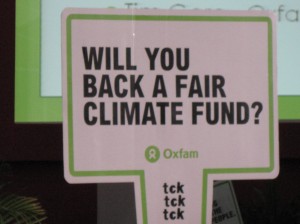On December 5th 2010, at the UNFCCC CoP 16 in Cancun, Mexico, Oxfam made a passionate statement for the establishment of a fair global climate action fund. Tim Gore, the organization’s international climate policy officer re-affirmed the opinion that the essential legally binding agreement on climate change will not be negotiated in Cancun, but in order to call the conference a success, an agreement to re-build trust between rich an poor countries could be arranged. He was referring to the establishment of a fair global climate action fund.
Oxfam presented a statement by civil society, signed by more than 200 organizations, calling for a fair fund which can deliver tangible outcomes for poor people all over the world. The urgent need for such a fund is highlighted by the current, “broken arrangements” which do not deliver money to people who need them most and make poor countries jump through bureaucratic hoops to get financing.
Mr. Gore outlined the three guiding principles of the fund as such:
- The fund should be established under the United Nations. It is the only forum where all countries are equally represented and the poorest states can have their voices heard.
- It should be based on the principle of equitable representation. The current fund is strongly dominated by donor countries, and not the recipient states who know how to spend the money best.
- Simplification – the need for a one-stop-shop. Financing should not be diluted through other institutions and red-tape for access to the fund should be reduced to a minimum. For the least-developed countries in the world, it has proven nearly impossible to jump through the bureaucratic hoops associated with obtaining funds.
- Concentrating on adaptation – the current financing mechanisms allocate around 10% of funds to adaptation, and the other 90% for mitigation. For Oxfam, “this has to change in Cancun”!
At the CoP 15 in Copenhagen in 2009, an agreement was made that funding should be balanced between mitigation and adaptation. Yet, reports show that this has not been implemented into practice. In order for this to happen, a concrete percentage should be agreed upon, and it should be 50%. If this happens, then “Cancun will be a success,” stated Mr. Gore.
In support of Oxfam’s idea, Mrs. Judith McGregor, the British Ambassador to Mexico, also expressed her sincere hope that this new climate action fund will be agreed upon in Cancun. In her words, three main objectives have to be included into the fund’s structure. First, a formal connection to the UNFCCC has to be present to ensure that the CoP can guide the fund, while functioning independently. Second, the voice of developing countries is crucial to the process, and this should be evident in the fund’s structure through the inclusion of both donor and recipient countries. Third, the simplification of the procedure for access to the fund should be based on country-owned plans.
In Mrs. McGregor’s words, the scale of the climate change problem means “making hard choices and bringing in new concepts unfamiliar to the UNFCCC”. For example, the World Bank should be asked to be the fund’s treasurer. This idea rose protests from some participants in the debate, yet Oxfam also supports the idea that the global financial institution should play a role in the new fund.
The key concept guiding the fund is that it should be ‘fair’. Mr. Evans Njewa, the chief finance negotiator for the least-developed counties at the CoP 16 stated his firm support of the idea. He reaffirmed that the 48 poorest nations in the world have conceived their national adaptation plans mainly concentrating on agriculture, and it is these projects which are in dire need of financing. Mr. Njewa proposed that if 50% of funds were allocated for adaptation, the LDC’s would receive around 60% of the total financing, which would allow concrete action to take place.
The source of the financing was not clear from the presentations or the debate which took place. The representatives of Oxfam and the UK government supported the idea that both public and private entities should contribute, while Mr. Njewa proposed that the fund should be mostly public. This issue is nevertheless left up to the donor countries, who have to provide the finance.
Whether negotiations will lead to the signing of an agreement on a fair climate action fund remains to be seen before the end of the CoP 16. The position of the LDC’s is clear: this fund is essential to the adaptation of their economies to combat climate change. Whether the donor countries share the same view is unclear, although Mrs. McGregor’s enthusiasm for the fund provides a note of optimism to the negotiations. Yet, whether the negotiation of an agreement on this issue can make the overall CoP 16 a success remains doubtful.


